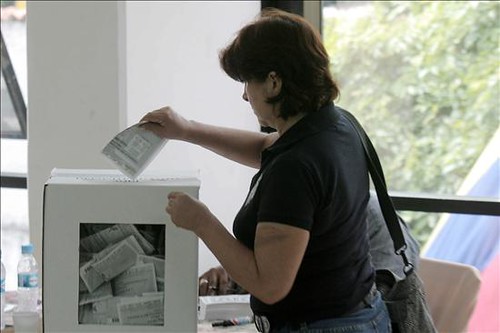Venezuela: Guterres calls for ‘complete transparency’ following disputed presidential election

Last Sunday, July 28, Venezuelan presidential elections were held with a recorded attendance of 59% of valid voters, according to figures from the National Electoral Council (CNE for its acronym in Spanish). UN Secretary-General António Guterres has commended the people of Venezuela “for their determination to express their will peacefully through the ballot box,” his Spokesperson said on Monday. These were elections considered crucial for the opposition since several polls attributed it a wide advantage over Chavismo, which has been in power for 25 years. In the most conservative cases, the gap was 12 points for opposition leader, Edmundo González, over Maduro. In others, it exceeded 25 points.
However, following hours of delays, incumbent Nicolás Maduro was formally declared winner of the disputed presidential election, securing a third term in office. The opposition immediately denounced irregularities. María Corina Machado, vice presidential candidate, said that according to the records available to them, González obtained 70% of the votes and that the opposition won in all territories. For his part, Nicolás Maduro, standing on the balcony of the Miraflores presidential palace, publicly thanked the victory and declared “I can say in front of the people of Venezuela and the world: I am President Nicolás Maduro, re-elected president of the Bolivarian Republic of Venezuela, and I will defend our democracy, our law and our people”.
Statements from international entities and organizations were released, led by the Secretary-General calling for complete transparency and encouraging the timely publication of the election results and a breakdown by polling stations, as well as, reiterating that electoral authorities should undertake their work independently and without interference to guarantee the free expression of the will of the electorate. The Secretary of State of the United States, Antony Blinken, stated that “[we] have serious concerns that the announced result does not reflect the will or votes of the Venezuelan people. It is essential that every vote be counted fairly and transparently, that election officials immediately share information with the opposition and independent observers without delay.” The UN and the Carter Center, which were the only two independent election observers allowed into the country, also called for a timely release of the results.
Other Latin American countries, including Argentina, Chile, Costa Rica, Peru, Panama, the Dominican Republic and Uruguay, refused to recognize the results and recalled their diplomatic staff in the country on Monday. The Maduro government accused the nations of being a “group of right-wing governments subordinate to Washington, openly committed to the most sordid fascist ideological positions.”
UN Spokesperson Stéphane Dujarric told journalists in New York that the UN Panel of Electoral Experts deployed to Venezuela ahead of the vote will report to the Secretary-General at some point during the coming week. A Panel of Electoral Experts is among the various types of electoral assistance that the UN may provide to Member States at their request.
If Maduro takes office in January, he would be sworn in for another six-year term, extending his presidency until 2031. He assumed the presidency in 2013, after his predecessor Hugo Chávez died of an apparent heart attack. The prospect of another six years may be enough to ensure that – as has happened too often in the past – many Venezuelans decide they have no choice but to leave the country in search of safety and better economic and living conditions. Nearly 8 million people have left Venezuela since 2014, according to the United Nations High Commissioner for Refugees (UNHCR).
To challenge the election in Venezuela, the opposition has 20 days after the official declaration of a winner to present an appeal to the CNE. After the CNE, they can go before the Electoral Chamber of the Supreme Court of Justice to demand the annulment of the election. Finally, there is the appeal for review before the Constitutional Chamber. Both the CNE and the Judiciary are made up of people related to Chavismo.

